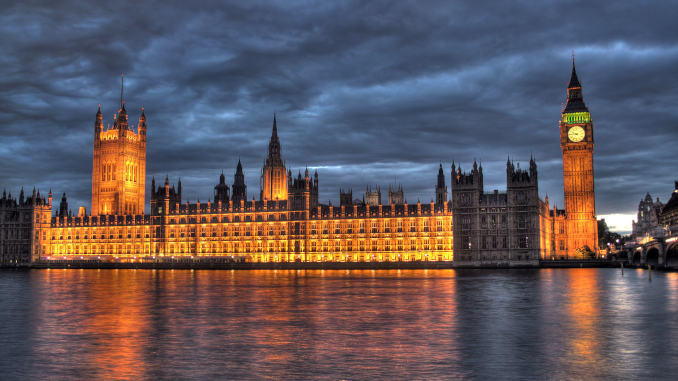
By Nick Griffin
The political elite in Britain are just waking up to the fact that they face potential electoral annihilation over the next four years. The last week have seen major opinion polls showing an extraordinary rise in the popularity of Nigel Farage and his new party, Reform UK.
Click the Link Below to Listen to the Audio of this Article
For months now, the Reform Party has been snapping at the heels of the Conservatives, who in turn were still well behind the Labour government, despite the growing unpopularity of the Keir Starmer regime.
Just a couple of weeks ago, Reform pushed the Tories into third place, but now they have leapfrogged Labour as well. A “YouGov” poll put Reform ahead for the first time, with 25%, one point above Labour, and four ahead of the Tories. Then a “FindOutNow” poll put Reform on 29%, four points ahead of Labour and a staggering 11 points in front of the Tories.
Things are even worse for the old parties than this suggests. The “FindOutNow” poll is weighted against people who didn’t vote in the last general election. They are only included in the final headline calculation if they say they are “definitely” going to vote this time. This is because past voting behavior is generally more predictive than declared intentions.
Generally,—but not in this case—because the last general election saw a drastically reduced turnout of just 59.7%. This was nearly an 8% drop from the previous contest, and it overwhelmingly reflects the disgust of people who had voted for Brexit (in a 72% turnout), only to find the entire political class trying to weasel out of delivering the promises of Brexit. A vote for Reform is their revenge.
Further, the broadcast media’s relentless dismissal of Reform voters as ignorant fools and bigots has led to the phenomenon of “shy” Reform voters, who will not tell a pollster of their intention to vote for the new party. In addition, there are two factors which have scarcely come into effect yet:
So far, most new Reform voters are coming from the Conservative Party. And there are millions more of them who hate the Tory grandees for their globalist liberalism, cowardice, Europhilia, and their broken promises to “get a grip on immigration.”
Their primary reason for continuing to vote Conservative was that they see Labour as even worse, and feared that voting for another party would “let Labour in.” But all that has just changed. With Reform trouncing the Tories in the opinion polls, it is they who are now the “wasted vote,” and Reform which is the best chance of beating Starmer & Co.
Hence, the Tory meltdown to Reform has much further to go. But another drastic change of voter loyalty is also on the way. For the 10 years during which the British National Party led the electoral insurgency against the Lab-Con duopoly, the vast majority of the support came from former Labour voters.
Although Reform has policies closer to those of the Conservatives, unless Starmer very rapidly jettisons Labour’s net zero insanity, stops talking about paying $18 trillion in slavery reparations, and halts immigration, then very large numbers of Labour voters are also going to switch sides. Reform, quite simply, has the potential to decimate both old “parties of government.”
It may not happen. Labour and the Tories might both lurch to the right. Farage may be hit with some dirty tricks and smears, although there is a real risk that such efforts might just add to his appeal as an “outsider.”
Personally, I do not support Farage. He is pro-economic migration, pro-corporate looting, pro-NATO, fanatically Zionist, pro-abortion and pro-“gay rights” (although, to be fair, he is actually “anti-trans”). But my opinion of his policies doesn’t alter the fact that Reform could well be about to redraw the map of British politics.
There is, however, more to the rise of Farage than purely domestic political considerations. Apart from his Brexit stance, the one point on which Farage is even more at odds with the UK political establishment is his skepticism of continuing to fund the Ukraine war. He has offered the standard ritual condemnation of Vladimir Putin, but also blames NATO for “poking the bear” and points out that the West provoked Russia by NATO’s relentless expansion eastward. [See page 25 of this issue of AFP for a new book that explains how the U.S. provoked the new Cold War.—Ed.]
Farage is thus on the side not only of Donald Trump, but also of the U.S. Deep State faction that seeks a reverse version of the old Zbigniew Brzezinski–Henry Kissinger plan to split the Sino-Soviet alliance. The old Cold Warmongers wanted to break the enemy block by improving the West’s relationship with China, and isolating Russia—which they see as the bigger threat.
More recently, as Cold War II took hold, there seems to have been general agreement among Deep State foreign policy makers that they could deal with the China-Russia threat by using Ukraine. After Victoria Nuland, George Soros and Co. ran their Maidan Coup, the Ukrainian army, and especially its ultra-right punishment battalions, were built up.
The idea was that a lightning Ukrainian strike on the Donbass would lead to the ethnic cleansing of Russian-speakers, in a move similar to Croatia’s 1995 CIA-backed “Operation Storm,” during which hundreds of Serbian civilians were butchered, sparking the flight of at least 200,000 more.
This would have discredited Putin and opened the door to regime change in Moscow. The installation of a Western puppet on the Zelensky model would have left Russia vulnerable to a renewal of the “Western” looting of the Boris Yeltsin years and isolated China, in the process. The plan failed when Putin launched his special military operation as a pre-emptive strike.
Three years later, it is clear that Ukraine and NATO have lost the resulting war. The only thing the “West” has to show for all the money and materiel thrown away is a Russia that is both militarily and economically stronger, and even closer to China.
This Democrat foreign policy disaster has strengthened the position of the Beltway’s China hawks, who believe that the best way to prevent a closer alliance between Russia and China is for American policymakers to recognize that Russia has separate and legitimate interests.
Trump’s determination to end the war is influenced by the same rationale: “The one thing you never want to happen is you never want Russia and China uniting. I’m going to have to un-unite them, and I think I can do that.”
The Ukraine gambit was played by an alliance of Democrats, European liberals, upper-class Brits and U.S.-based Jews—who share ancestral Russophobia—and homosexual intellectuals, a little-noticed sub-mafia in the legacy media. This anti-Russian bloc cannot be reprogrammed, so it has to be replaced if the switch to confronting China is to be flipped.
Getting Trump re-elected was the most important part of this foreign policy pivot, but it would be very helpful to get the UK on board as well. There is no prospect of this happening if the Russophobic Conservative-Labour uniparty remains in power.
Hence the Deep State interest in promoting Farage—the man they used to deal a major blow to their other geo-political rival, the European Union, through Brexit.
Farage won the vote by harnessing the collective rage of the British working and taxpaying classes over seeing their country handed over to foreigners and woke lunatics. But he also very clearly had help from sections of the U.S. Deep State. That will go into overdrive between now and the UK general election of 2029. Nigel is their man, and, with their backing, he really has a chance.
Nick Griffin is a British nationalist commentator and writer. He was chairman of the British National Party (BNP) from 1999 to 2014, and a Member of the European Parliament for North West England from 2009 to 2014. Since then, Griffin has remained active in British politics despite being vilified for criticizing rampant immigration into the United Kingdom. Contact: t.me/NickGriffin.






